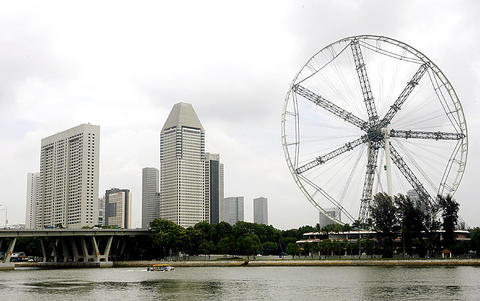The world's biggest observation wheel is ready to start up in Singapore tonight, with corporate clients paying thousands of dollars for the "inaugural flight," the company said.
At 165m, the Singapore Flyer will be 30m higher than Britain's London Eye, said Great Wheel Corp, which built the Singapore attraction.
"We're actually ahead of time and on budget," David Beevers, general manager of the Singapore Flyer, said from the waterfront site. "It's all systems go."

PHOTO: AFP
The wheel will start twirling just before dusk, organizers said.
The attraction's first three nights were sold out, Beevers said. Companies and individuals paid S$8,888 (US$6,271), considered an auspicious number, for the first rides.
"Through the month of February ... it's a whole series of private events each day that's going to allow us to ramp up to full opening March 1 for the public," Beevers said.
Groups of between 600 and 1,000 people were expected at the initial private events, Beevers said, with a formal opening to take place on April 15.
Unlike small Ferris wheel carriages that hang in the open air, the Singapore Flyer and other large observation wheels feature fixed "capsules."
The 28 capsules -- each about the size of a city bus -- are air conditioned and can hold up to 28 people each.
Among the first clients will be SG Private Banking. The French-based global private wealth manager has booked 11 capsules on Wednesday night for its annual staff celebration of the Lunar New Year, said Pierre Baer, the company's Singapore and South Asia chief executive officer.
Developers of the Singapore Flyer said there was no comparison between a giant, slowly rotating observation wheel and a Ferris wheel.
"We don't use the `F-word,'" Florian Bollen, the chairman of Singapore Flyer, told reporters during a preview of the attraction last year.
Bollen's Singapore-based company, Great Wheel Corp, is also building wheels in Beijing and Berlin which will edge out the Singapore Flyer as the world's biggest when they begin turning in about two years, he said.
Singapore's wheel is located across from the Marina Bay Sands casino complex set to open in 2009, and is near the pit area of a Formula One Grand Prix street race to be held for the first time in the city-state in September.
The Singapore Flyer project, worth about S$240 million, is a private venture backed mainly by German investors. But Bollen said it received strong marketing and other support from the city-state's tourism board.
Bollen said that his company was the only bidder for the project designed by Kisho Kurokawa Architects and Associates of Tokyo, along with Singapore's DP Architects.
The wheel was built by Mitsubishi Corp and Takenaka Corp of Japan.

Semiconductor business between Taiwan and the US is a “win-win” model for both sides given the high level of complementarity, the government said yesterday responding to tariff threats from US President Donald Trump. Home to the world’s largest contract chipmaker, Taiwan Semiconductor Manufacturing Co (TSMC, 台積電), Taiwan is a key link in the global technology supply chain for companies such as Apple Inc and Nvidia Corp. Trump said on Monday he plans to impose tariffs on imported chips, pharmaceuticals and steel in an effort to get the producers to make them in the US. “Taiwan and the US semiconductor and other technology industries

SMALL AND EFFICIENT: The Chinese AI app’s initial success has spurred worries in the US that its tech giants’ massive AI spending needs re-evaluation, a market strategist said Chinese artificial intelligence (AI) start-up DeepSeek’s (深度求索) eponymous AI assistant rocketed to the top of Apple Inc’s iPhone download charts, stirring doubts in Silicon Valley about the strength of the US’ technological dominance. The app’s underlying AI model is widely seen as competitive with OpenAI and Meta Platforms Inc’s latest. Its claim that it cost much less to train and develop triggered share moves across Asia’s supply chain. Chinese tech firms linked to DeepSeek, such as Iflytek Co (科大訊飛), surged yesterday, while chipmaking tool makers like Advantest Corp slumped on the potential threat to demand for Nvidia Corp’s AI accelerators. US stock

The US Federal Reserve is expected to announce a pause in rate cuts on Wednesday, as policymakers look to continue tackling inflation under close and vocal scrutiny from US President Donald Trump. The Fed cut its key lending rate by a full percentage point in the final four months of last year and indicated it would move more cautiously going forward amid an uptick in inflation away from its long-term target of 2 percent. “I think they will do nothing, and I think they should do nothing,” Federal Reserve Bank of St Louis former president Jim Bullard said. “I think the

Cryptocurrencies gave a lukewarm reception to US President Donald Trump’s first policy moves on digital assets, notching small gains after he commissioned a report on regulation and a crypto reserve. Bitcoin has been broadly steady since Trump took office on Monday and was trading at about US$105,000 yesterday as some of the euphoria around a hoped-for revolution in cryptocurrency regulation ebbed. Smaller cryptocurrency ether has likewise had a fairly steady week, although was up 5 percent in the Asia day to US$3,420. Bitcoin had been one of the most spectacular “Trump trades” in financial markets, gaining 50 percent to break above US$100,000 and